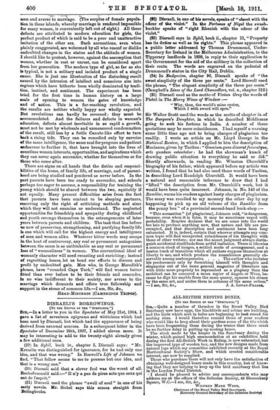DISRAELI'S BORROWINGS.
[To THE EDITOR OP THE "SPECTATOR."]
Bra,—In a letter to you in the Spectator of May 21st, 1904, I gave a list of seventeen epigrams and witticisms which had been used by Disraeli, but which had the appearance of being derived from external sources. In a subsequent letter in the Spectator of December 28th, 1907, I added eleven more. It may be interesting to add to the twenty-eight already given a few additional ones.
(29) In Sybil, book iv., chapter 5, Disraeli says : " Mr. Kremlin was distinguished for ignorance, for he had only one idea, and that was wrong." In Boswell's Life of Johnson we find, " That fellow seems to me to possess but one idea, and that is a wrong one."
(30) Disraeli said that a clever fool was the worst of all. Rochefoucauld said :—" 11 n'y a pas de pires sots que ceux qui out de l'esprit."
(31) Disraeli used the phrase "swell of soul" in one of his early novels. Mr. Sichel says this comes straight from Bolingbroke. (82) Disraeli, in one of his novels, speaks of " claret with the odour of the violet" In the Fortunes of Nigel the swash- buckler speaks of " right Rhenish with the odour of the
violet."
(83) Disraeli says in Sybil, book ii., chapter 11, "Property has its duties as well as its rights." This phrase appeared in a public letter addressed by Thomas Drummond, Under-
Secretary for Ireland in the Melbourne Administration, to the Tipperary landlords in 1838, in reply to their application to the Government for the aid of the military in the collection of their rents. The words are engraved on the pedestal of Drummond's statue in the City Hall, Dublin.
(34) In Enclymion, chapter 96, Disraeli speaks of "the sweet simplicity of the three per cents." Lord Stowell used the phrase, " The elegant simplicity of the three per cents." (Campbell's Lives of the Lord Chancellors, vol. x., chapter 212.) (35) Disraeli used as the motto of Vivian Grey the words of Pistol in The Merry Wives of Windsor :—
" Why, then, the world's mine oyster, Which I with sword will open."
Sir Walter Scott used the words as the motto of chapter ix. of The Surgeon's Daughter, in which he described liliddlemas going to seek his fortune in India. A number of those quotations may be mere coincidences. I had myself a warning some little time ago not to bring charges of plagiarism too readily. I wrote an article on Mr. Lloyd George in the National Review, in which I applied to him the description of Mucianus, given by Tacitus : " Omnium guae dizerat feceratgue, arts quadam ostentator : he had the showman's knack of
drawing public attention to everything he said or did." Shortly afterwards, in reading Mr. Winston Churchill's biography of his father, which appeared before my article was written, I found that he had also used those words of Tacitus, in describing Lord Randolph Churchill. It would have been
a natural and reasonable inference to draw that I had "lifted" the description from Mr. Churchill's work, but it would have been quite incorrect. Johnson, in No. 14-3 of the Rambler, warns his readers against hasty charges of plagiarism. The essay was recalled to my memory the other day by my happening to pick up an old volume of the Rambler from the penny box" of a provincial second-hand book-shop :— " This accusation" (of plagiarism), Johnson said, "is dangerous, because, even when it is false, it may be sometimes urged with probability. Bruyere declares that we are come into the world too late to produce anything new, that nature and life are pre- occupied, and that description and sentiment have been long exhausted. It is, indeed, certain that whoever attempts any com- mon topic will find unexpected coincidences of his thoughts with those of other writers ; nor can the nicest judgment always distin- guish accidental similitude from artful imitation. There is likewise a common stock of images, a settled mode of arrangement, and a beaten track of transition which all authors suppose themselves at liberty to use, and which produce the resemblance generally ob- servable among contemporaries. . . . The author who imitates his predecessors only by furnishing himself with thoughts and elegancies out of the same general magazine of literature can with little more propriety be reproached as a plagiary than the architect can be censured a mean copier of Angelo or Wren, be- cause he digs his marble from the same quarry, squares his stones by the same art, and unites them in columns of the same orders."










































 Previous page
Previous page